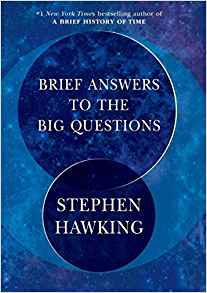 Stephen Hawking, Brief Answers to the Big Questions (New York: Bantam, 2018), 230pp.
Stephen Hawking, Brief Answers to the Big Questions (New York: Bantam, 2018), 230pp.
When Stephen Hawking died on March 14, 2018 at the age of 76, he was the most famous scientist in the world since Einstein. As the Lucasian Professor of Mathematics at Cambridge University for thirty years, he was a brilliant theoretical physicist. At the age of twenty he was diagnosed with "motor neurone disease" or ALS (amyotrophic lateral sclerosis or Lou Gehrig's disease), and told that he had five years to live.
This book begins with a brief autobiographical chapter, and then ends with an afterword by his daughter Lucy. Throughout much of his life, and in eight popular books that were meant for a general audience (like his 1988 A Brief History of Time), Hawking addressed a broad range of cultural questions beyond his expertise in cosmology. This book was well underway at the time of his death, and was finished by his family and colleagues. Here are the "Big Questions" that Hawking explores with his "Brief Answers."
1. Is there a God?
2. How did it all begin?
3. Is there other intelligent life in the universe?
4. Can we predict the future?
5. What is inside a black hole?
6. Is time travel possible?
7. Will we survive on Earth?
8. Should we colonize space?
9. Will artificial intelligence outsmart us?
10. How do we shape the future?
My takeaways from the book are twofold.
First, Hawking espouses some form of atheistic scientism — the belief that natural science is the only or best method of reliable knowledge about what is worth knowing. This includes an epistemological claim that science is the only way to know, and an ontological claim that the physical world is the only thing there is to know.
Second, in my reading there's a deep contradiction in Hawking's thinking. On the one hand, he writes that he's well known as an optimist, and so he says that "there are no fundamental limits to what can be achieved" by science (186). On the other hand, he's deeply pessimistic about the future of humanity, which he considers "mainly a history of stupidity." He believes that nuclear and environmental catastrophes in the next thousand years are "inevitable."
Consequently, in his view our only hope rests with colonizing space and the development of Artificial Intelligence. He never explains how and why humanity will do better in space than we have on earth. And he is well aware of the potentially terrifying dangers of AI. Nonetheless, he says that he is "optimistic that we will ultimately create viable habitats for the human race on other planets. We will transcend the Earth and learn to exist in space" (210). If we do not colonize space, says Hawking, we have no future (165, 169).
Stephen Hawking was born on the 300th anniversary of Galileo's death, and died on the 139th anniversary of Einstein's birth. Today his ashes are interred in Westminster Abbey between Charles Darwin and Isaac Newton.
Dan Clendenin: dan@journeywithjesus.net


